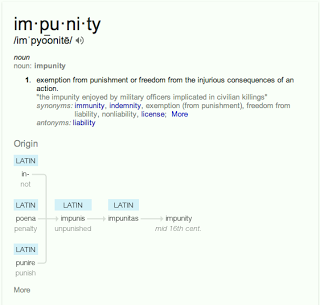
In its latest editorial, National Catholic Reporter recounts the story about which I wrote two days ago--the courageous (but failed, that she had to resign) attempt of canonist Jennifer Haselberger to challenge St. Paul-Minneapolis Archbishop John Nienstedt to remove Father Curtis Wehmeyer (and, later, Father Jonathan Shelley) from ministry after it was known that Wehmeyer and Jonathan posed threats to minors. NCR also examines a parallel case from the Trenton, New Jersey, diocese involving a priest, Father Matthew Riedlinger, who was caught in a sting in which he believed he was exchanging sexually explicit text messages with a 16-year-old boy.
The editorial concludes:
These two cases clearly show why Catholics continue to mistrust bishops. Despite all the good that the church has done to protect children in the 11 years since the Dallas Charter was adopted, bishops and their officers ignore these standards. They ignore them because they have impunity. Priests can be removed from ministry with just the suspicion of wrongdoing. Bishops and their staff face no consequences. They stay in office and are even promoted. Until that changes, the abuses and cover-ups will continue.
The bishops and their officers ignore the standards of the Dallas Charter "because they have impunity": as Daniel Callahan pointed out in a classic statement on America's Catholic bishops in the Atlantic in 1967,
Within his own diocese a bishop is close to being a sovereign lord. He bears ultimate responsibility for the teaching of Church doctrine, the allocation of funds, the construction of buildings and churches, the assignment of clerical personnel, and the spiritual well-being of his people. Short of the Pope himself, there is no one who can challenge him for leadership or power.
The governing system of the Catholic church is configured in such a way that a bishop is responsible to no one except to the pope. The impunity (literally: "without punishment") with which bishops operate is part and parcel of the Catholic system of church governance. No matter what the laity, who constitute over 99% of the membership of the church and foot its bills, think or want, bishops do what they intend--without fear of punishment, except insofar as they answer to the pope as their ultimate authority figure.
Until this governing system is changed in a fundamental way, we'll continue to see one cover-up after another like the ones about which we've just learned from the archdiocese of St. Paul-Minneapolis. And, tragically, as we learn about that cover-up by an archbishop who has fought tooth and nail against the rights of gay citizens of the U.S., a certain contingent of Catholics want to continue arguing that the abuse crisis is all about gay priests molesting teenaged boys. These Catholics are perfectly willing, in other words, to do the dirty work of anti-gay bishops who use homophobia as a smokescreen to divert attention from their failure of pastoral leadership, as they keep priests who pose a danger to minors in ministry.
The red-herring analysis that blames gay priests for the abuse crisis totally overlooks the many cases in which priests have abused girls; and it totally overlooks the testimony of SNAP that around half of those seeking SNAP's assistance or attending SNAP meetings are women; and it chooses to treat the conclusions of the John Jay Study, based on the biggest slice of data about the abuse crisis provided to anyone, that sexual orientation is a bogus issue in understanding the abuse crisis as contemptible conclusions, ones not worth considering.
Because, as Father Joseph O'Leary argues in the thread following the preceding NCR editorial, the John Jay researchers (who are in no way connected to the Catholic church) "were bamboozled by the nervous antics of politically correct gays and fearful of giving aid and support to the Vatican's attempted anti-gay crackdown." And as he also notes, the fiercely anti-gay right-wing political activist Bill Donohue has it right when he maintains that the abuse crisis is all about gay priests abusing teenaged boys--though Donohue clearly pushes that thesis because he wants to engage in gay-bashing and wants to provide cover for the fiercely anti-gay bishops who have focused obsessively on the purported "sins" of gay folks while giving priests molesting minors a free pass.
How this diversionary scapegoating analysis gets us to the real matter at hand--addressing the unmerited power and privilege of members of the clerical club and how that unmerited clerical power and privilege deeply corrupt the Catholic church--is beyond me to understand. One can only conclude that this is, in fact, the whole point of the gay-bashing and the scapegoating: to shield the clerical system from the kind of thoroughgoing critical analysis and the kind of thoroughgoing reform it demands, if we Catholics are to put the abuse crisis behind us.

